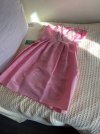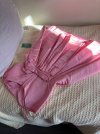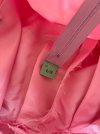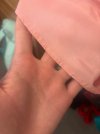Pompadour
Registered Guest
Hi everyone! I just bought this dress on eBay advertised as 50s. But when it came in it doesn’t have the typical metal zipper as seen on pre-1962 dresses. It also seems too short to be a 1950s dress with a skirt length of 21”. I’m not sure whether this is a 1970s dress attempting to do 50s, or if it’s a 1960s dress. Does anyone have a better clue? There’s no union label either. I’d love some feedback! 




